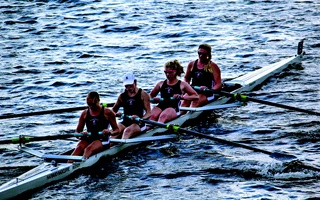Radcliffe coach Liz O’Leary has more than one role to play on Head of the Charles weekend. While her rowers trained for their Regatta events, O’Leary was preparing for her own contest in the Master’s eight, a race that has become a personal tradition, dating back to a missed Olympic opportunity.
In 1980, O’Leary was a member of the U.S. Olympic rowing team that was gearing up for a medal attempt in Moscow. After tasting Olympic competition in 1976, she was eager for another opportunity. With shock and disbelief, the rowers learned of President Jimmy Carter’s decision to boycott the Games as protest against the Soviet Union’s invasion of Afghanistan. Endeavors to persuade political officials not to punish the athletes proved useless—the closest O’Leary came to the 1980 Olympics was a satellite feed of the races underway without her boat.
More than twenty years later, the members of the 1980 Olympic team maintain a bond forged in remembrance of the denied opportunity. Following the incident, the team formed the 1980 Rowing Club, which has competed in the Head of the Charles every year since then.
“We race as [the] 1980 [crew] with the intention being that we don’t want anybody to forget,” O’Leary said.
Both the men’s and women’s boats have remained close throughout the years, gathering each fall to share company and the joys of rowing. Though all are intense competitors, winning is kept firmly in perspective.
“Our goal is to continue to keep everybody’s eyes open to what happened to us and what we believe is right,” O’Leary said.
The Renown of Radcliffe
Since retiring from competition in 1984, O’Leary has pursued the same standard of excellence in coaching that she sought as an athlete. A 1976 graduate of the University of New Hampshire, she participated in six World Championships in addition to being a member of both the 1976 and 1980 Olympic Teams. As a coach, her credits include the 1988 Olympic Team and seven World Championship teams.
Coming to Radcliffe presented new opportunities in an Ivy League full of historically well-established rowing programs, but O’Leary has not shirked the challenge. Since her arrival in 1987, she has led Radcliffe teams to an appearance at every NCAA Championship since its inception seven years ago.
“Outside of Harvard, you’ll get people saying, ‘Oh, you row for Radcliffe,’ or ‘Oh, you go to Harvard and you’re on the women’s rowing team,’” she said. “You’re recognized as being a pretty impressive person.”
Since women’s heavyweight rowing became an NCAA sport seven years ago, its popularity has blossomed. For many schools, it has served as a perfect solution to the gender equity issues raised by Title IX, a reply to that persistent issue—what will be the women’s football?
“Rowing is a sport that answers that question,” said O’Leary.
With 60 or 70 women on a roster, varsity crew involves more people than most other women’s athletic teams, while requiring minimal space.
“We just need a river and lots of boats,” she laughed.
Coaching As An Athlete
Read more in Sports
Football Battles for Ivy SupremacyRecommended Articles
-
Freak Accidents Mark Head of the CharlesThree rowers were injured and two champion teams disqualified from the Head of the Charles Regatta after freak boating accidents
-
English Major is Poetry in MotionIt took only three years for Lis Lambert to go from a walk-on who never considered herself an athlete to
-
 Lofgren's Journey Ends With Gold
Lofgren's Journey Ends With Gold -
Radcliffe Looks Up to Coach O’LearyIt was the night before the varsity eight race that would determine the 2003 women’s rowing national championship. Teammates Caryn ...
-
 Radcliffe Novice Rowers Dominate First Fall Season
Radcliffe Novice Rowers Dominate First Fall Season













